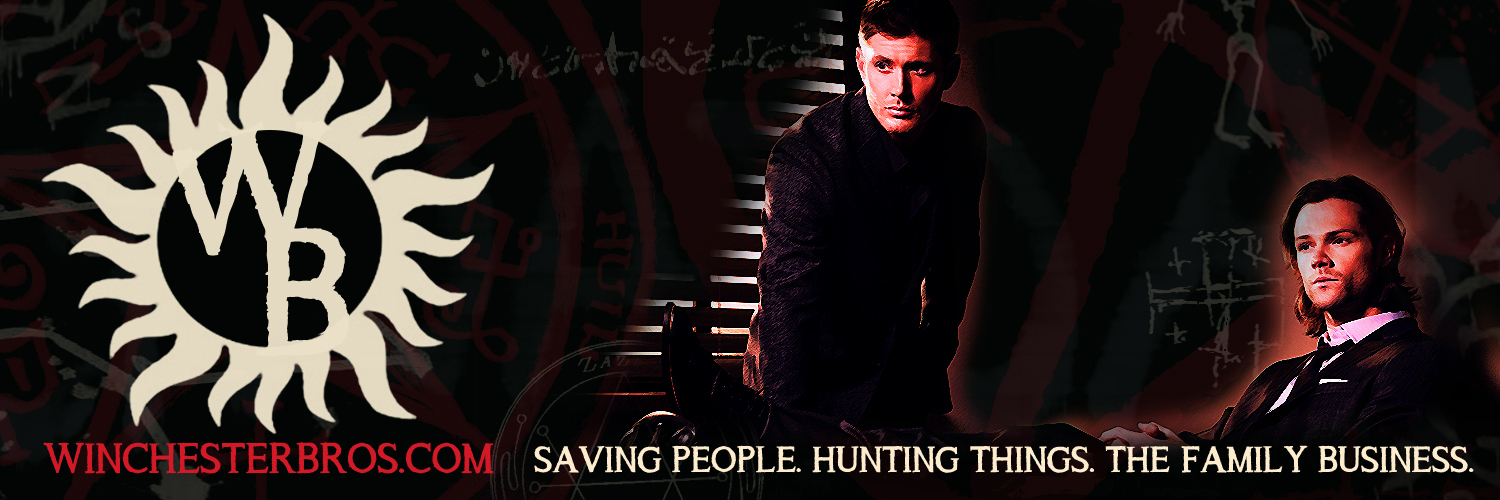By John Keegan
Visit The Shrine of Entil'zha for an archive of John's TV Review archives!
I get the distinct feeling that the writers for “Supernatural” are trying to bring some of the lighter moments into the season early because the latter half of the season is going to be the darkest stretch yet. Even episodes like this, clearly based on an idea with pure comic potential, comes to a close with a heavy dose of dread. Considering that it’s the apocalypse, that’s probably not a huge shock.
Comedy is subjective, but I thought it was great to see the writers spoof their own most difficult timeslot competition. “CSI” has some truly awful writing and acting across the board, and “Grey’s Anatomy” is overwrought soap opera. I loved the sitcom opening credits and the “Knight Rider” spoof, and that commercial fooled me the first time through.
Not everything worked as well as it could have. I thought the Japanese game show segment had the right idea, but the real thing has a much more frenetic energy to it. I think the director played it too straight. And I was also a bit annoyed with the fact that Sam was getting the short end of the stick too often. Sure, the previous Trickster episode was rough on Dean, but it seemed a little one-sided.
I will give the writers credit for not beating the audience over the head with some of the context. When Sam brought up the idea of allying with the Trickster against the rebellious angels and demons, I was sure that Dean would rip into Sam with a laundry list of past transgressions. After all, after all that Sam did in the fourth season, making that suggestion is a questionable move. But Dean didn’t need to say anything; his expression more than said it all.
The heart of the episode, however, comes with the final act. I’m not sure about the revelation that the Trickster has always been Gabriel. While it does explain his ability to keep coming back for more and the similarity in powers, it does seem like unnecessary retroactive continuity. Despite that, it was a great opportunity for the writers to dispense some story exposition with a twist.
At this point, we must assume that the rebellious angels are unreliable in terms of information. They have their own perspective on matters, and that perspective is often skewed by their own assumptions and bitterness. Angel dialogue is as much about reading between the lines as anything else.
So I accept the idea that the Brothers Winchester were chosen because of their relationship to their father. It ties the whole second half of the series thus far to the first half, which is a brilliant move. Clearly the writers designed the whole God/angels/Lucifer dynamic around the earlier John/Dean/Sam dynamic, and that makes sense out of a lot of what has happened since the beginning of the fourth season. (And perhaps this will prove to those still insisting this is intentional Christian-hating blasphemy that they have been barking up the wrong tree.)
In fact, Gabriel’s explanation provides two strong clues that there is, in fact, a God waiting to be uncovered before the end. First, Gabriel says that Sam and Dean were always destined to play the roles of Michael and Lucifer, because the angels knew from the moment that God’s plan for humanity was set in motion that this was going to be the trigger for the end of the world.
While Christian lore is certainly different in the “Supernatural” mythos, this plays on the traditional notion that all things have evolved along a path that God determined was necessary for humanity. All the good and bad things are the product of events set in motion at the dawn of time. The subtext of that worldview is actually quite clear: God knew that this moment would come. In other words, if he’s absent from the perspective of the angels, it’s because that was part of the plan. And logically speaking, if the angels were always meant to stray and “go rogue” as part of the plan, they would not be privy to any outcome of the grand design that countered their anticipated result. The angels wouldn’t see another possible end to the apocalypse, because they were never meant to see the big picture. (Hence, why their perspective is unreliable.)
That means that God could still be out there, waiting for the Brothers Winchester and Castiel to find him, so that the real conclusion to the plan can unfold. This is supported by the “as above, so below” parallel. Sam and Dean both had their Daddy issues, and John was absent for a good long while, but John never really gave up on his sons. So it stands to reason that God is waiting for the right moment, and that he has his own ideas of the destiny for the Brothers Winchester.
To take the parallel further (and perhaps to reveal how long the hints of the parallel were right there to be found), John regretted bringing Sam and Dean into the hunting world. When he had another son, Adam, he chose to take a different path and give Adam other choices. In other words, Sam and Dean were given a path to follow and a life mission to obey, whereas Adam was given free will to make his own choices, good or bad. The writers clearly intended the parallel between the angels (Dean), Lucifer (Sam), and humanity (Adam).
It’s also worth noting that everything prior to this episode was simply the introductory phase of the season arc. This episode shifts the story into the complication phase, and that is typically when a lot of assumptions are proven wrong. At the same time, this is clearly the climax phase of the five-year plan, so even minor situations hold a powerful weight.
Visit the Episode Discussion Thread to discuss this review
